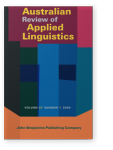Vol. 27:1 (2004) ► pp.15–29
The study of language and subject English
Applied linguistics has not sufficiently addressed theories of teaching subject English in the mainstream classroom. This is unfortunate because applied linguistic theories can offer a great deal to the development of a theory of subject English. Over the last century, subject English has changed quite fundamentally, and it is increasingly in need of a theory of language to shape its future. At the end of the 19th century, English was a set of discrete English skills. Later, as literature achieved greater status at the university level, its teaching was also brought into school English, though the discrete skills and literary pursuits were at best brought into an uneasy amalgam. By the 1960s, in an effort to overcome the uneasy amalgam, “integrated” models of English teaching were proposed, and it was argued that the goal of the English program should be to promote “growth” through language. Terms like “language development” were adopted in English, though this was ironically at a time that teaching of knowledge about language became discredited. By the 21st century English had become increasingly synonymous with “literacy”, though a robust theory of knowledge about language was badly needed. Subject English needs new directions, of a kind that functional theories of language can provide.
